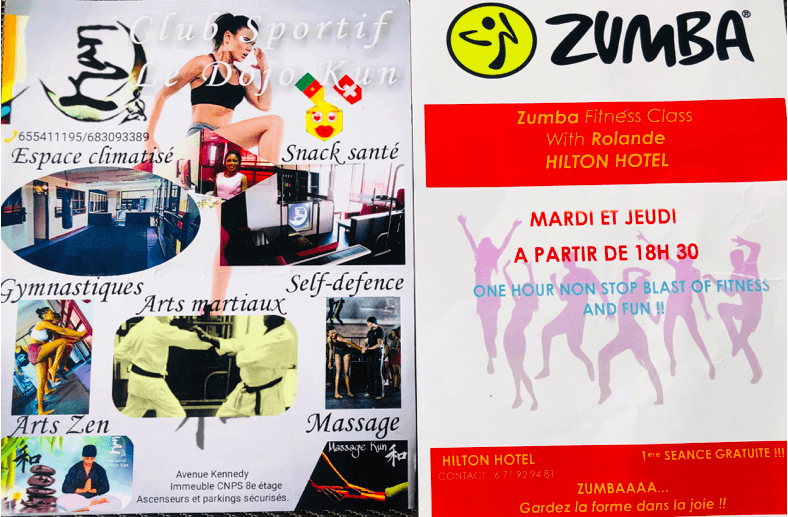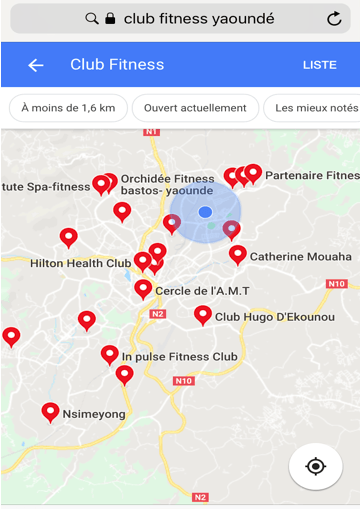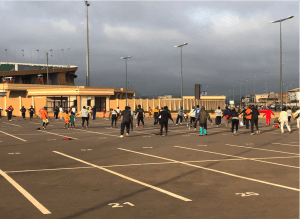Zumba Class: local and global fitness in Yaoundé — by Patrick Awondo
By Xin Yuan Wang, on 26 March 2019
It is 4pm on a Thursday afternoon, rush hour for taxi drivers in Yaounde, capital of Cameroon. Along a busy central street of the city, a loudspeaker perched on the roof of a pickup announces the opening of a “new fitness club”. His slogan, “Zumba keep fit in joy!” The Zumba club is advertised in a large city hotel in the heart of the administrative and commercial district.
Another day, another setting, at a junction near a popular downtown area is another professional announcer, this time aboard a mini van with speakers on the hood, informing pedestrians of the opening of the « sports club- the Kun dojo ». The leaflet distributed by one of the advertisers emphasizes that there are other activities also: “Zen Arts”, “Massages Kun”, gymnastics, all in an “air-conditioned” space where there is also a “health snack” “.
These two scenes have become commonplace in the city of Yaoundé. In almost the entire city and regardless of the socio-economic environment (upscale, medium, poor), there are fitness clubs, or just “sports clubs” with varying levels of equipment, but with always with the same ambition of bringing fitness to people of every condition – with only condition: the ability to pay for fitness.
Fitness and Zumba in Yaoundé
In past years, Ludo-sports practices in Yaoundé were marked by two major characteristics. On the one hand, their popular, participative and socializing dimension, on the other hand, their outdoor exercise. At the turn of the 2000s there was, in order of popularity, football in groups still called “two-zero”; basket ball named “candy”, a “sports walk” also practiced in groups and a race. If this logic is more or less the same, we are witnessing the rise of sports-leisure in the gym club and especially fitness.
Initially called “gym club” and located in only upscale neighborhoods or in the center city near some luxury hotels, “gym” has now mutated into fitness clubs. What is the difference between these two?When you go to the gym in Yaounde, the rooms are large spaces where machines are arranged to support activities.
In the fitness club, spaces are more liberated. There are fewer machines or almost none at all. In clubs where zumba is practiced, the machines are practically non-existent.
Another change, while coaches for sports clubs and gyms used to be male, today we are witnessing a feminization of this coaching scene, as we can see on the Zumba club announcement poster with coach Yolande. This feminization marks a trend that emphasizes local ownership of fashionable practices at the global level. In the Bastos district, one of the city’s most exclusive places to live, yoga clubs that did not exist until very recently have been created and are open to a mixed clientele. In addition to expatriates living in this cosmopolitan area, people from the middle class in Yaounde also attend.
Another trend, Asian massages are more and more evident. These are both related to the global circulation of fitness and its variations such as Zumba, but also the ever-increasing presence of Chinese people, Indo-Pakistani or Indian. From this point of view, sport-fitness and massage or Zen sport practices constitute a paradigm of the globalization of sport. As in Western countries, these practices reflect a bourgeois ethos which is expressed by the fact that these practices are found first in exclusive areas before migrating gradually to the less affluent areas. The cost to join varies from 20 000XAF (30 euros) to 40 000XAF (60 euros) per week according to the place and district where it is situated. A Zumba club situated in an international well-known hotel will not have the same cost as that situated in a lower income area.
The interviews we had in Yaoundé show that motivations to join a club vary from leisure, pleasure to networking. Some informants -mostly women -in those fitness clubs come to « keep fit » while others come to have fun and pleasure. Most of the informants say that maintaining health is the primary source of motivation. People say they “have to move”their bodies. This expression is itself related to the presence of French and Western media. The slogan “eat-move” often publicised by some French media strongly resonates.
The motivation linked to the idea of ”moving” comes from the public health discourse largely taken up by members of fitness groups. The link between sport and health is once again part of a globalization of sport practices. Strongly promoted by the World Health Organization, relayed by public media and very present on the internet and now on WhatsApp and other blogs followed by thousands of people, sport for health is constantly reiterated in the global circulation of practices and speeches.
Ludo-sporting practices also have sociological and strategic motivations such as affiliation needs. Contrary to what might appear these personal activities that do not necessarily involve a team are also capitalized on by some people to create a network of social ties in specific areas. It is obvious that one does not meet the same people in Mvog-Ada a deprived district than in Bastos the district of expatriates, diplomatic representations and international NGOs. The audiences participating in the yoga sessions at the Hilton hotel a central location are not the same as at the sports clubs of the University of Yaounde.
The new Ludo-sports practices are thus like other sporting activities: the places of regulation of the social experiments and quests of oneself in the double meaning of personal sports itinerary and of need of affirmation within specious social classes. Zumba and fitness also play a social performative role in certain circumstances. Practicing Zumba is adhering to the latest practice that is fashionable at the global level. A 42-year-old informant working in a bank in Yaounde said she liked trying out the latest trends in sports. As many Yaoundéens practitioners try to be open to new things and participate in the world.
Fitness, internet
A quick search by the search engine Google allows us to see the locations of some gym clubs in Yaoundé. This deserves some comment. Firstly regarding their density. Those who appear on the search are not the only ones. Then, far from being a phenomenon of higher class and upscale neighborhoods, we see draw a map covering the entire city.
This presence on the internet is accompanied by a very strong publicization of some of these clubs. Most of them hold facebook pages on which are regularly posted numerous videos and photographs of participants in the activities. The idea is then to stage a crowd of fitness fans and other activities offered in the clubs. In all cases, the publicity measures taken by the fitness club highlights the strength of the circulation of Ludo-sporting practices and their appropriation at the local level.
 Close
Close







